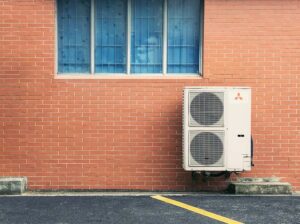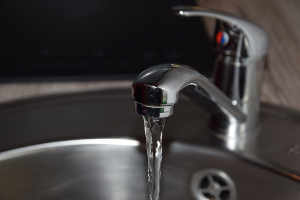Unless a plumbing problem is obvious – like a clogged toilet or leaking water heater – it tends to go unnoticed. This, of course, is not a good thing. Undetected plumbing issues lead to damage of whatever comes into contact with the resulting water leak – such as drywall, subflooring, flooring, foundation slabs, etc. Obviously, being able to recognize the early signs of trouble can help prevent more extensive damage and the expense involved in repairs.
As we covered in our blog post – “Why Are My Pipes Leaking?” – corroding pipes are a common cause of leaks, as the inside of pipe walls may corrode or rust over time. This happens faster if you have hard water, a high pH level (acidity) or particularly high water pressure. As pipes corrode, they can’t handle the pressure or force of water flowing through them. Eventually, that pressure and force may create a leak in a particularly corroded section.
Telltale Signs of Corrosion to Look For
So how can you tell if your pipes are corroding? Because most of your house’s pipes are out of sight, they’re usually out of mind, but keep on the lookout for the following, courtesy of the good people at SageWater:
Low water pressure – Low water pressure is an indicator of severely corroded pipes. As corrosion builds up inside the pipe, water flow is drastically reduced to faucets, showerheads and more.
Drain backups – Corrosion of your drain, waste, and vent (DWV) pipes can cause major blockages and even complete structural failure. Slow-draining water, odors and backups are all symptoms of a corroded DWV piping system.
Extreme fluctuations in hot water temperature – Hot water pipes corrode faster than cold water pipes. Due to the corrosion in these pipes, debris collects in the anti-scalding components of sinks, tub, or shower valves, causing excessive fluctuations in hot water temperature.
Discolored water – Brown- or red-tinted water is a sign that your pipes are corroding. As the interior of the pipes rust, metal flakes off the pipe, causing the water to become discolored.
Chronic leaks – As pipes begin to fail, leaks can occur more frequently. Repairing one leak without investigating the cause (as may be the case with a DIY repair) will not address the greater issue over the long run.
Noisy plumbing – Your plumbing system should operate quietly. Clanking, clicks, thuds and groans from your piping system are caused by variances in pressure or temperature – which raise a big red flag that something’s wrong.
Some visible signs of corrosion – Look at your exposed piping for evidence – for example, a bluish-green tint on copper pipes. Also, rust-colored powder on your pipes, discoloration of any kind, flaking, and dimpling all indicate corrosion.
What Causes Pipe Corrosion?
There are many factors that cause corrosion. It is true that older pipes are prone to corrosion, but even newer pipes can corrode, and do so quickly. E.R. Services Plumbing provides the following most common reasons:
Low pH – If the pH of your water is acidic or neutral, it can cause copper pipes to corrode quickly. A value of 7 represents neutral pH. Values that are below 7 denote the acidic nature of water, and those above 7 denote alkalinity. An alkaline water pH will form a copper oxide film on the inside of copper pipes, which minimizes corrosion. However, if the pH value is neutral or acidic, it will cause your copper pipes to corrode quickly because the copper oxide coat dissolves – which can cause pinhole leaks. Keep reading to learn more about copper pipe corrosion.
Oxidation and water temperature – Your water system is constantly being replenished with oxygenated water. That means air has been dissolved into the water, comprised of approximately 30% oxygen and 70% nitrogen. Nitrogen is non-corrosive, but oxygen corrodes metal through a process called oxidation. This is when the metal converts to oxide (rust), and the metal thins and weakens as more of it rusts. As corrosion continues, rust accumulates inside the pipes. Rust is not smooth, and the nooks and crannies in this uneven surface attract and capture impurities in the water, causing build-up inside the pipes. Eventually, the metal thins, becoming vulnerable to pinhole leaks and breakage.
It is also crucial to understand that the process of oxidation increases when the water temperature is high – which is why hot water lines corrode faster.
Too high-water velocity – In a closed-loop piping system, erosion corrosion can occur because of flow obstacles, such as excess solder. Improperly soldered joints are more prone to corrosion.
Chemical drain cleaners – Drain cleaners might solve your problem instantly, but they can cause extensive damage to your pipes. Make sure you don’t get into a habit of using drain cleaners to clear your blockages, because they do more harm to your pipes in the long run.
A Few Words About Copper Pipes
Most homes in the United States have copper pipes, which have been in use since 1963 for plumbing systems and domestic water supplies. However, copper pipes are vulnerable to corrosion. There are three types of copper pitting corrosion:
Type I – This type of corrosion occurs if you have hard to moderately hard water (where the pH is between 7 to 7.8). Cold water lines are more prone to this type of corrosion.
Type II – This type of corrosion occurs if the water pH is below 7.2 and the hot water temperature is over 140-degree F.
Type III – This type of corrosion occurs in cold water where the pH value exceeds 8. Corrosion of this type might not cause pipe breakage, but it can result in discoloration, byproduct releases and pipe blockage issues.
A Few Words About Galvanized Pipes
Galvanized pipes are steel pipes that have been dipped in a protective zinc coating to prevent corrosion and rust. This type of piping was commonly installed in homes built before 1960. When it was invented, galvanized pipe was an alternative to lead pipe for water supply lines. However, minerals present in the water react with the pipe, resulting in mineral buildup. This, in turn, results in corrosion.
A Few Words About Polybutylene Pipes
Polybutylene is an inexpensive, flexible plastic that was used for residential piping from 1978 to 1995. However, it’s extremely vulnerable to rupturing (which ultimately led to a class action lawsuit), and therefore is no longer accepted by U.S. building codes. If your pipes are white plastic and include the letters “PB” in the printed label, you have polybutylene pipes. We recommend replacing them immediately.
The Take-Home Message
Now that you know the telltale signs, being observant won’t prevent your plumbing pipes from corroding, but you’ll be able to contact us when you see (or hear) evidence of trouble before greater damage occurs. Our master plumbers at Adams and Son Plumbing have proudly served Central Florida homes and businesses with the highest level of quality and experience for over 60 years. We are family-owned and operated, and all of our plumbers are state-certified master plumbers. You can always count on us to keep your plumbing in top repair!
The post How to Tell if Your Pipes are Corroding appeared first on Adams and Son Plumbing Services.
 When you buy any type of HVAC system, we know that you’re buying it with the intention of it lasting as long as it possibly can. We know that this applies to your water softener as well. Finding a great water softener and getting it to last is important. It’s also necessary in a place like Orlando. If you’re wondering how long this system can last, then we’re here to answer your question.
When you buy any type of HVAC system, we know that you’re buying it with the intention of it lasting as long as it possibly can. We know that this applies to your water softener as well. Finding a great water softener and getting it to last is important. It’s also necessary in a place like Orlando. If you’re wondering how long this system can last, then we’re here to answer your question.
 Leak detection and repair are among the most important services we offer for
Leak detection and repair are among the most important services we offer for 


 Many homeowners in our area choose to provide their home with well water. Well water is a great option, but it does put the responsibility of ensuring that your home’s water is safe in your own hands. This begs the question—what should you look out for? We’re here to cover this today.
Many homeowners in our area choose to provide their home with well water. Well water is a great option, but it does put the responsibility of ensuring that your home’s water is safe in your own hands. This begs the question—what should you look out for? We’re here to cover this today.